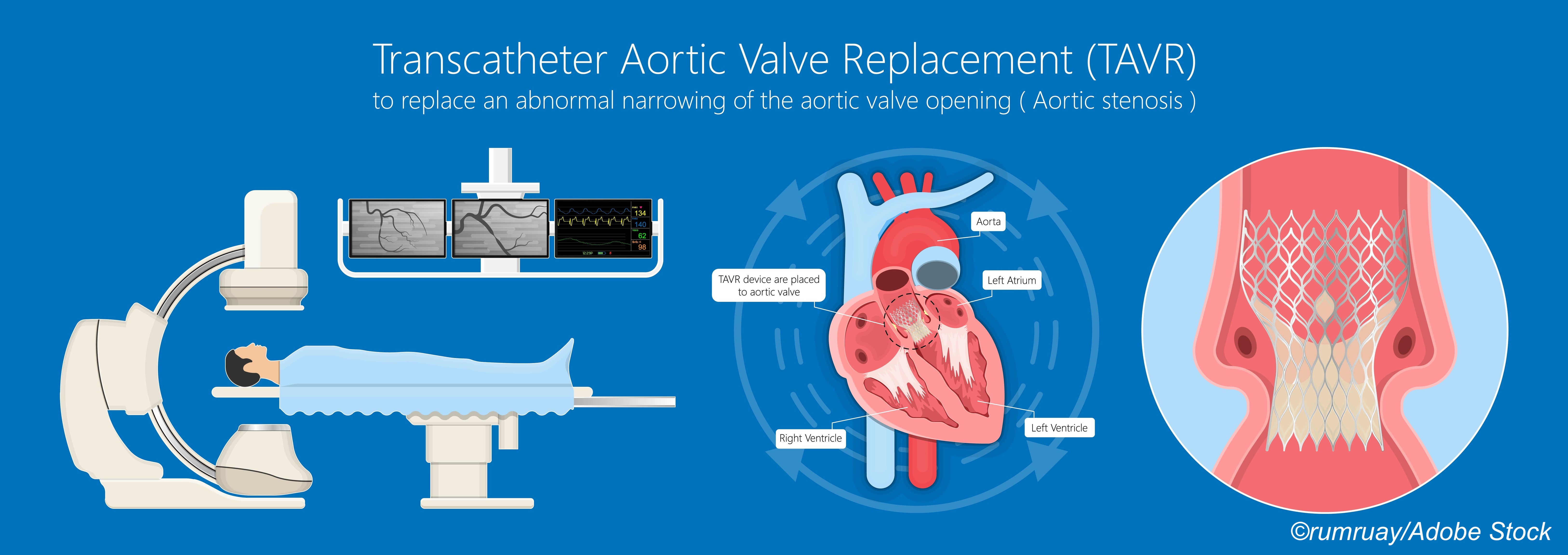ACC: TAVR Valves May Be More Durable Than Valves Implanted Surgically
Study finds less structural valve deterioration with TAVI
04/06/2022
Peggy Peck, Editor-in-Chief, BreakingMED™
Vandana G. Abramson, MD, Associate Professor of Medicine, Vanderbilt University Medical Center
Be aware that a pooled analysis comparing 5-year outcomes of patients who underwent transcatheter aortic valve implant (TAVI) procedures versus surgical valve implant suggests that TAVI may offer a more durable option.
Note that this analysis is the largest to date comparing long-term outcomes of catheter-based versus surgical aortic valve implants.

WASHINGTON—The generally accepted belief about aortic valve replacement goes like this: a biologic valve inserted surgically is longer lasting than a valve inserted via catheter, so go for surgery if the valve needs to last longer.
But as it turns out, data don’t support that belief.
A pooled analysis that examined the 5-year incidence, outcomes, and predictors of hemodynamic structural valve deterioration (SVD) among patients who underwent replacement using a trans-aortic valve implant (TAVI) versus surgical implant found a "significantly lower rate of SVD with TAVI versus surgery—4.38% versus 2.57%, (P=0.0095 [Fine-Gray P value])," said Michael J. Reardon, MD, professor of cardiothoracic surgery and Allison Family Distinguished chair of cardiovascular research at Houston Methodist DeBakey Heart and Vascular Center, in a late-breaking clinical trials presentation at the American College of Cardiology’s 2022 annual meeting.
Moreover, the SVD rate difference was also lower through 5 years in small annuli—5.86% versus 1.39%, (P=0.049 [Fine-Gray P value]). In larger annuli, the SVD rate still favored TAVI but the difference was not significant, 3.96% versus 2.48% (P=0.067 [Fine-Gray P value]).
"Doppler-derived SVD imparted a near 2-fold risk for all-cause mortality (P<0.001) and hospitalization for AV disease or worsening heart failure (P=0.01) at 5 years," Reardon said.
The analysis also linked risk of developing SVD to patients with higher body surface area. Conversely, risk was lower in men, older patients, and patients with a history of PCI procedures or atrial fibrillation.
TAVI, also known as transaortic valve replacement or TAVR, used bioprosthetic valves, so the surgical comparator arm included only those biologic valves, excluding mechanical valves, which can be implanted surgically. The analysis used data from the CoveValve US High Risk Pivotal Trial and the SURTAVI Intermediate Risk Trial, both randomized, controlled trials, and two non-RCTs: CoveValve US Extreme Risk Pivotal Trial and CoreValve Continued Access Study (CAS). Reardon noted that this is the largest study to date assessing longer term outcomes from randomized trials of the two approaches.
Asked to put the findings in clinical perspective, Reardon told BreakingMED, "I don’t think this indicates need for a change in guidelines, but it certainly will change the conversation within the heart team, and it will change my conversation with patients. I can’t say surgery is better, will give you a longer lasting valve."
Megan Coyleweight, MD, vice-chief of cardiology and director of the structural heart unit at Erlanger Heart and Lung Institute in Chattanooga, Tennessee, said the finding is especially important, "because this is not what we’ve been telling patients, which is particularly important as we see young patients seeking AV replacement—patients who expect to live longer. We don’t want to see them coming back again and again for replacements."
Cardiothoracic surgeon James B. McClurken of Doylestown Health Cardiothoracic and Vascular Surgery outside of Philadelphia agreed with Coyleweight, noting that the belief that surgically implanted valves were more durable was based on "the fact that we’ve been using them longer."
TAVI, which was originally approved for elderly, frail patients who were unlikely to survive the rigors of surgery, had only been used for a little over a decade, when the PARTNER trial made the case that TAVI was as good as SAVI (surgical aortic valve implant). That trial, and a series of similar trials that followed, demonstrated that TAVI was "noninferior to surgery, but I think we can say more than that now," Reardon said. "Using Doppler echocardiography alone, we have shown that SVD occurred statistically significantly more frequently with SAVR than with TAVR and was associated with a doubling of risk for mortality or rehospitalization for valve failure."
And with PARTNER came the concept of "the heart team" by which surgeons, interventional cardiologists, and medical cardiologists would all consult to decide the best treatment option for patients with aortic stenosis. It is there, Reardon predicted, that the conversation will now begin to change.
In their analysis, Reardon and colleagues defined SVD as at least moderate hemodynamic valve deterioration, which met these criteria:
- "Increase in mean gradient ≥ 10 mmHg from discharge/30 day-echo to last available echo and mean gradient ≥ 20 mmHg at last available echo.
- "New onset or increase of intra-prosthetic aortic regurgitation (AR)≥ moderate."
Finally, Reardon added this caveat: "It is important to remember that valve repair—if possible—is always going to be superior to valve replace, regardless of procedure used to accomplish the replacement." Valve repair, for now, remains the domain of surgery.
Disclosures
The study was supported by Medtronic.
Reardon disclosed research grants from Abbott, Boston Scientific, Medtronic, and Gore Medical.
Coylewright is an advisor to Abbott, an independent or contracted researcher for Edwards Lifesciences and Boston Scientific and researcher for Alleviant.
McClurken had no disclosures.
Sources
Reardon MJ "5-year incidence, outcomes and predictors of structural valve deterioration of transcatheter and surgical aortic bioprostheses: Insights from the CoreValve US Pivotal and SURTAVI trials" Late Breaking Clinical Trials IV ; American College of Cardiology ACC.22 Conference April 4, 2022.